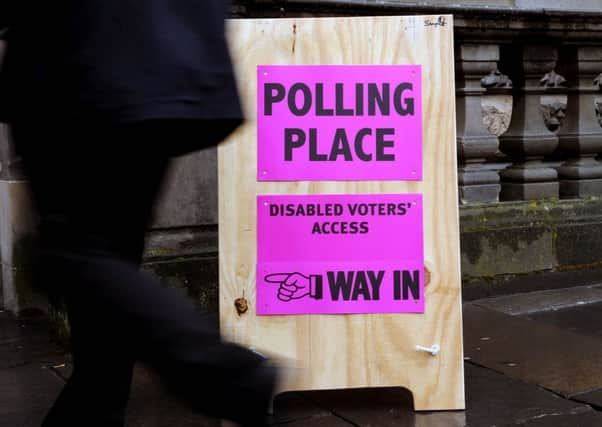Leaders: No disrespect in ballots being a few weeks apart


So, it now appears we could be going to the polling stations to vote two months in a row, with the Scottish Parliament elections in May followed by the EU referendum in June. Can the voters handle this much democracy in so short a time, and could it affect the result?
First Minister Nicola Sturgeon and Alex Salmond MP say such a decision detracts from discussion and is disrespectful to Scotland, leaving too little time for a thorough scrutiny of what is at stake.
Advertisement
Hide AdAdvertisement
Hide AdIs it disrespectful? Some people might see it that way, but it is probably more about finding a practical solution, albeit one which is compromised and risks election fatigue in parts of the country.
In an ideal world there would be a more daylight between the two votes. Which, by the way, is not just about Scotland. Wales and London also have ballots in May.
Some also say the June date is affected by the Scottish school holidays with many families having already flown off to the sun or camping in a remote location in the British Isles, and unlikely to have found the time to arrange a postal vote. Others even say the Euro 2016 football tournament dates could mean potential voters were away from home or perhaps too distracted by the drama unfolding on the pitch to carry out their civic duty by voting.
But hang on ... there will always be events that clash with elections. There is rarely a perfect date. And sometimes we overstate the effects of timetable clashes.
While it is probably true that voters in Scotland will not focus on the EU vote until after the Holyrood elections, most people will have formed a view on Europe already. Yes, this view may still be influenced by Prime Minister David Cameron’s attempts to renegotiate Britain’s position, but there would remain enough time to weigh up the issues and come to a conclusion.
There has already been months of discussion of Mr Cameron’s attempts to renegotiate Britain’s position, highlighted by his high-profile position on restricting benefits to migrants arriving in Britain. It is a debate which has already engaged a nation on television, radio phone-ins and discussions with friends and colleagues. We should not forget that voters, especially the young, were energised by the lively discussion in the run up to the Scottish referendum. There is a danger of under-estimating the electorate if we think two votes will be too much for people to cope with.
What would have been disrespectful would have been to hold the referendum in May, on the same day as the Holyrood elections. It is beyond dispute that this would have had a serious impact on both campaigns, and possibly the outcomes.
And yet there is a strong economic argument for holding two votes at the same time, because referenda are an expensive business. But what was once considered a real possibility has been discounted.
Advertisement
Hide AdAdvertisement
Hide AdWe should all be capable of coming to an informed decision on two different matters, a month apart, if that is what is required.
Nursing criticisms ring true
Professor Fiona McQueen has apologised for the upset she caused by criticising some members of the nursing profession for being rude and appearing to go to great lengths to avoid speaking to visitors on the wards, or are harsh to patients themselves.
Whilst Unison, the nursing union, has sent Prof McQueen a formal letter of complaint, perhaps many of us will recognise much of what she said.
Arriving at a ward and trying to get a nurse to make eye-contact and take “ownership” of your inquiry, as a simple question is so often defined, can be a challenge. Being ignored by staff at such a worrying time can be an unsettling experience.
Sometimes visitors have to spend a lot of time tracking down the right information to find out about a loved one’s condition, or simply what ward they have been moved to.
We all know that nursing staff working in the cash-strapped NHS are under stress and that many wards and hospitals are understaffed. It could be that the nurses we judge as “rude” have been dealing with an acute situation just before we arrived and are pausing to gather strength before continuing with an exhausting shift.
But some of Prof McQueen’s observations, relayed to staff, ring true.
The majority of nursing staff are fantastic, working way beyond their hours for a pittance, and this criticism is not aimed at them.
Advertisement
Hide AdAdvertisement
Hide AdHowever, this is a difficult subject which needs to be talked about. No-one should feel uneasy about approaching a nurse. This row will do a lot of families a favour by shining a light on a problem that many will have felt unable to raise for fear of consequence.